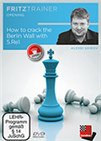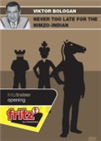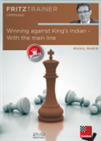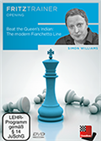Down to the wire
I cannot say that I followed the 2018 edition of the Russian Championship too closely, as it came on the heels of the Sinquefield Cup, which kept yours truly glued to the computer following eight-time Russian Champion Peter Svidler's broadcast from St. Louis.
Yet, I could not help but notice the abundance of interesting games in the young and very competitive field. Below is my selection of games from the last three rounds...and I had to make some cuts to keep this report from growing out of proportion.
Coming to the final stretch, leading the pack was the experienced Dmitry Jakovenko. He almost suffered a big setback in the following game.

Dmitry Jakovenko arrived in the last round as the sole leader | Photo: Eteri Kublashvili
I was impressed by the good showing of the two young talents Alexey Sarana and Grigoriy Oparin. They stayed competitive until the very end, albeit one could tell they were getting a bit tired.
 Alexei Shirov shows on this DVD how White can develop pressure and seize the initiative with 5.Re1 against the Berlin Wall.
Alexei Shirov shows on this DVD how White can develop pressure and seize the initiative with 5.Re1 against the Berlin Wall.
Alexey Sarana had a respectable debut finishing on 5/11 | Photo: Eteri Kublashvili
Nepo had a mysterious tournament. A phlegmatic start turned into a near disaster as Ian lost two games and was near the bottom of the standings, while facing yet another gigantic loss of rating points. To give him full credit, he woke up after the rest day and started winning games. Maybe he finally learned to appreciate the exotic offerings of Satka, a small town in the Chelyabinsk region of the Southern Urals (this is my take on Ian's tweets about "...depressing place, depressing play and depressing tournament...").
Nepo almost made it 4/4 in the following game.
 Bologan's way to the Nimzo-Indian was very long and difficult, but now the Moldavian grandmaster recommends the Nimzo-Indian to players of all levels because it’s complex and simple at the same time.
Bologan's way to the Nimzo-Indian was very long and difficult, but now the Moldavian grandmaster recommends the Nimzo-Indian to players of all levels because it’s complex and simple at the same time.
Nepomniachtchi recovered from his bad start, but was not fully satisfied anyway | Photo: Eteri Kublashvili
A disappointing miss by Ian, but still, his resurgence bodes well for Russia's chances at the Olympiad. His teammates will need Nepo and Jakovenko to carry the load, as I find it hard to expect strong performances from their top boards in Batumi.
Dmitry Jakovenko surged ahead in round ten with a trademark technical win. Dubov's tournament took a wrong turn before that — after starting with two wins with Black, he went back to a pedestrian 50% score. Still, one should expect a 2700-GM to handle rook endgames competently.
On the wings of the following incredible victory, Vladimir Fedoseev caught up with Andreikin, as they were only half a point behind the leader Jakovenko. Fedoseev's drive to win always fascinates me.
 In the classical system of the King's Indian White develops naturally and refrains from chasing ghosts looking for a refutation of Black's set-up. White instead relies on the fact that natural play should yield him a small but lasting advantage.
In the classical system of the King's Indian White develops naturally and refrains from chasing ghosts looking for a refutation of Black's set-up. White instead relies on the fact that natural play should yield him a small but lasting advantage.
Fedoseev always shows great fighting spirit | Photo: Eteri Kublashvili
The stage was set for the head-to-head battle, and then we saw the bad Fedoseev. Somehow he does not seems to be able to keep his nerve at the final stretch. Here is his track record in the last two years:
- St. Louis Winter Classic 2017 - lost to Shankland in the last round
- GRENKE Open 2017 - lost to Vitiugov in Round 8 (Vitiugov qualified for the next edition of the GRENKE Classic)
- ECC 2017 - lost to Brunello in the last round
- Russian Championship 2017 - lost to Svidler (eventual champion)
- World Rapid Championship - lost to Carlsen with four rounds to go after leading throughout
- World Blitz Championship - lost to Adly in the last round (granted, there was not much to play for)
- Aeroflot Open 2018 - lost to Tabatabaei in Round 6 and to Romanov in Round 7
- Poikovsky 2018 - lost a critical Round 6 game to Jakovenko, who later won the tournament
- Hainan Danzhou 2018 - lost in the penultimate round to the eventual winner Yu Yangyi
- Abu Dhabi Open 2018 - lost to Karthikeyan in Round 7 and finished a point behind the winners
And now this debacle:
The most alarming fact for Fedoseev's supporters is how Vladimir throws it away in simple endings. I can only hope it is not more than growing pains.
This allowed the quiet man Evgeny Tomashevsky to surge ahead and take third place.
What is particularly impressive is how Evgeny went for it, something that has unfortunately been lacking in his game lately.

Tomashevsky quietly finished in sole third place | Photo: Eteri Kublashvili
So, it finally came to a playoff for first place between the two Dmitrys.
 This DVD is packed full of new, exciting and novel ideas; based on a repertoire starting with the moves 1 d4 Nf6 2 c4 e6 3 Nf3 with g3! to follow.
This DVD is packed full of new, exciting and novel ideas; based on a repertoire starting with the moves 1 d4 Nf6 2 c4 e6 3 Nf3 with g3! to follow.
The playoff | Photo: Eteri Kublashvili
Andreikin's title is his second Championship after a six-year wait. Back in 2012, he won a massive playoff over five other contenders, which included Svidler and Karjakin. That success propelled Dmitry to a string of good results, culminating in his second place behind Kramnik in the 2013 World Cup, which was followed by a respectable showing at the Candidates next year (50%).
Andreikin seemed destined for a great career. Everything was there: youth, strong nerves and great skills in all aspects of the game. Ok, maybe not in opening theory, but that could be fixed, couldn't it?
However, Dmitry's tail wind suddenly abandoned him. He was mired in a long slump, as his rating never crossed over the 2750 mark...and soon almost dropped below 2700.
There could have been many reasons for that, and his new responsibilities as a husband and father may have been part of it, but in any case Andreikin's good play this summer is encouraging — a solid showing at the Chinese Team League, a massive 8½/10 tally at the Xtracon Open (second to Hammer on tie-breaks), and now the National Championship title!
Way to go, Dmitry! Congrats, and full speed ahead, albeit watch out for the speed limit when you drive your new car. [The tournament winner receives new car as part of his prize. -Ed.]
Final standings
(Andreikin won the playoff match 1½ : ½)
All games
Natalija Pogonina finishes strong
After losing twice in the first six rounds, Natalija Pogonina obtained four wins past the rest day to tie in first place with Olga Girya on 7½/11. Girya had a very different tournament, as she finished the eleven rounds undefeated. The title was decided with two 15+10 rapid games — Pogonina started with a white win and took a draw in a completely winning position to claim first place.
 After 1.d4 d5 many players with White avoid the great amount of theory in the Slav, Semi-Slav, QGA and Orthodox Queen's Gambit and do not therefore play 2.c4.
After 1.d4 d5 many players with White avoid the great amount of theory in the Slav, Semi-Slav, QGA and Orthodox Queen's Gambit and do not therefore play 2.c4.
Pogonina and Girya deciding the women's tournament | Photo: Eteri Kublashvili
This was Natalija's second triumph in a Superfinal and, interestingly, the last time she won — in 2012 — Dmitry Andreikin also got the title in the main section.
Final standings
(Pogonina won the playoff match 1½ : ½)
All games
Links
























